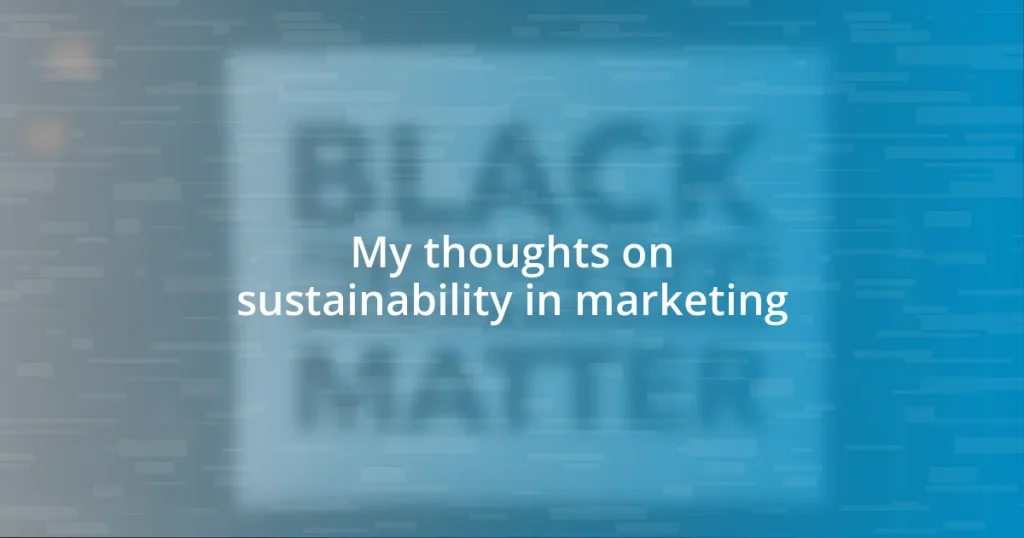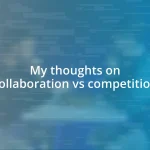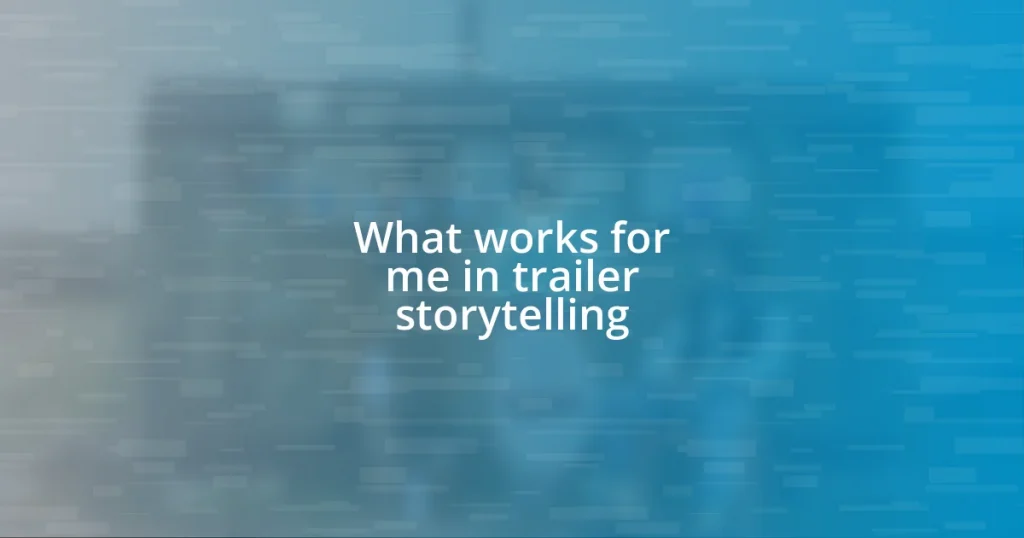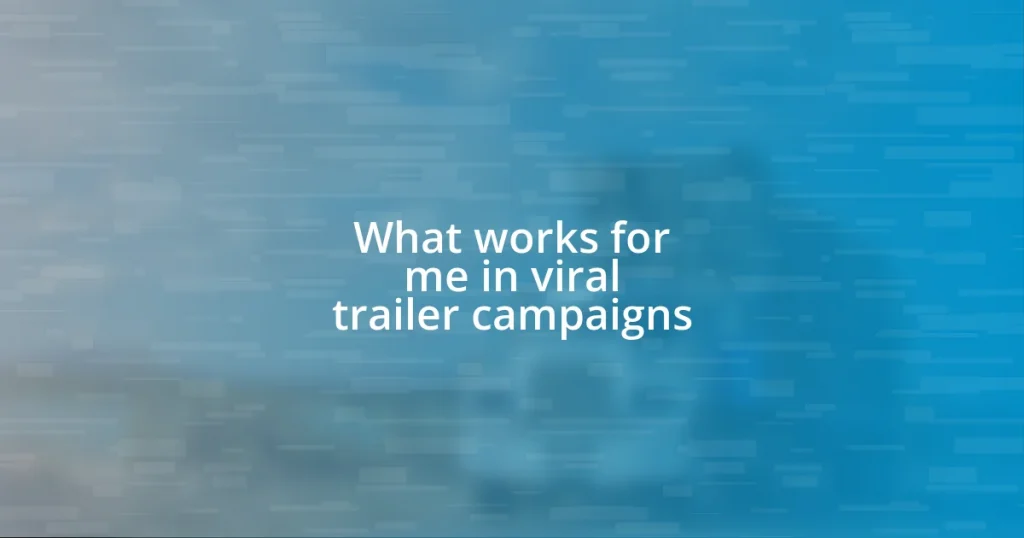Key takeaways:
- Sustainability in marketing fosters emotional connections and storytelling, leading to genuine consumer engagement and brand loyalty.
- Implementing sustainable practices enhances competitive advantage, reduces costs, and attracts talent, while also building community and shared responsibility with customers.
- Future trends in sustainable marketing include personalization, circular economy principles, and increased collaboration among brands to amplify sustainability efforts.
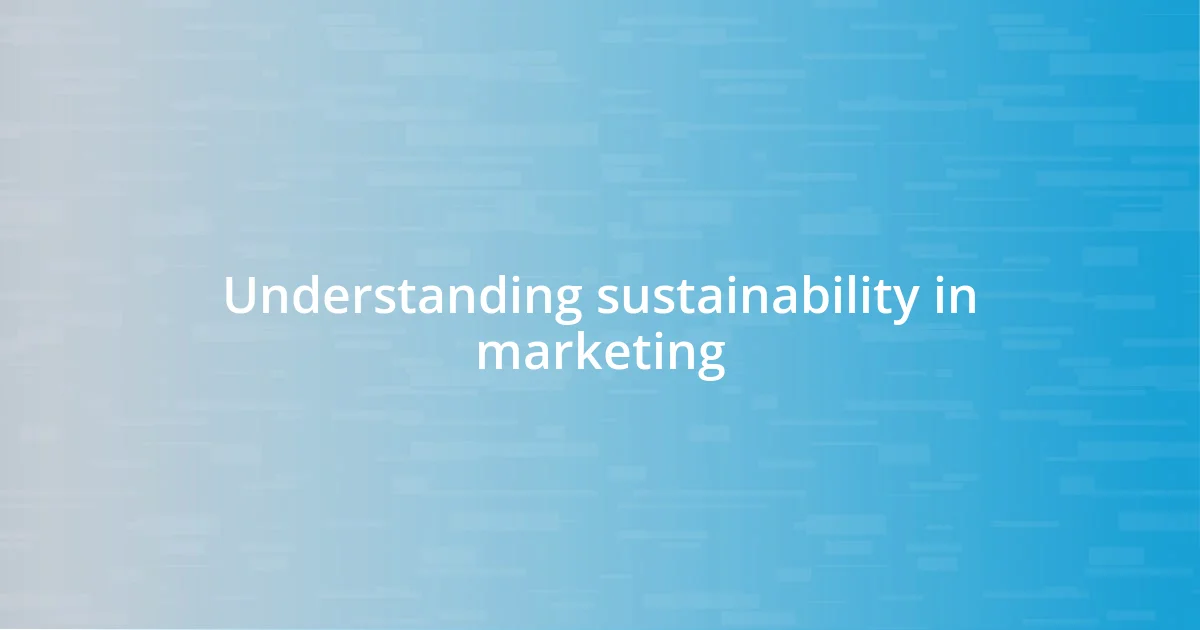
Understanding sustainability in marketing
Sustainability in marketing is more than just a buzzword; it’s a core philosophy that impacts every stage of the marketing process. I recall a campaign I worked on where we focused on eco-friendly products. The way consumers responded, not just with their wallets but with genuine passion for our message, was a revelation. Have you ever considered how emotional connections drive purchasing decisions? That’s the heart of sustainable marketing.
As I delved deeper into this topic, I realized that sustainability is about storytelling. When brands share their genuine commitment to environmental and social justice, it creates a powerful narrative that resonates with consumers. I often think about how brands like Patagonia have thrived; their transparent efforts to reduce environmental impact are integral to their identity, and this authenticity shines through in their marketing. Isn’t it inspiring how a brand can align its values with those of its customers?
Moreover, I believe sustainability challenges marketers to rethink traditional strategies. It’s not merely about green labels or ethical sourcing; it’s about creating lasting relationships and fostering community. A project I recently managed emphasized local partnerships, and the collaborative spirit transformed our outreach. It made me wonder: how can brands build deeper connections through sustainable practices that go beyond the surface? I find that sustainability in marketing opens the door to innovative ideas that benefit not just the planet but also the company’s bottom line.
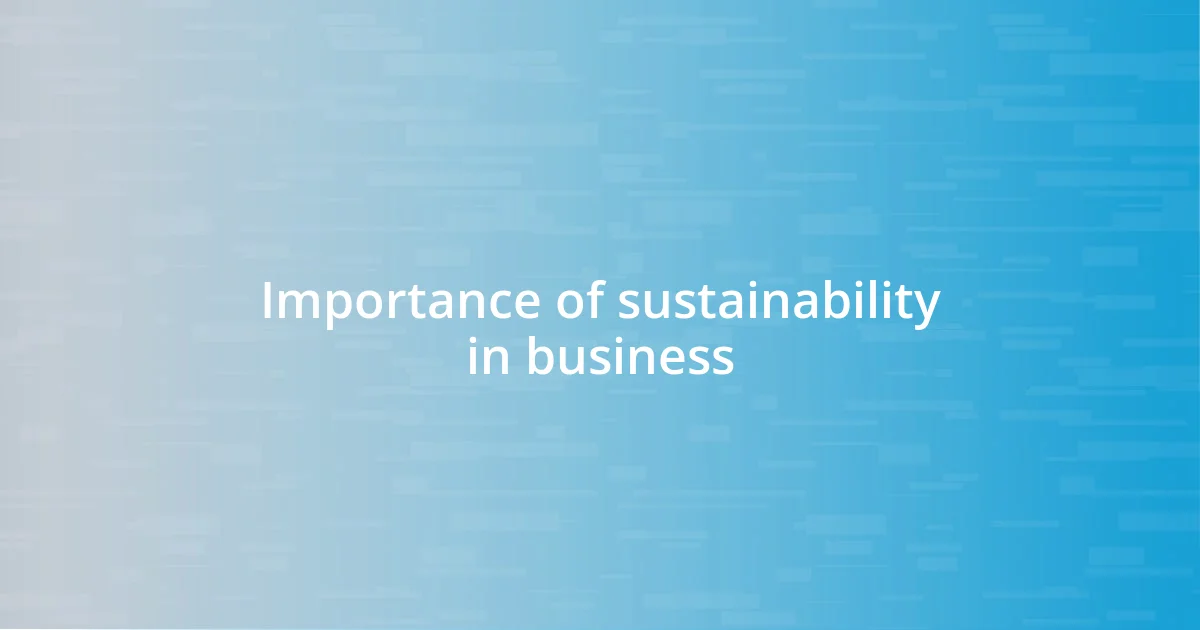
Importance of sustainability in business
Sustainability in business is not just a trend; it’s a crucial strategy that influences corporate reputation and customer loyalty. I remember a time when a company I consulted for revised its supply chain practices to be more sustainable. We saw immediate benefits not only in terms of reduced waste but also in customer feedback, which emphasized their appreciation for a brand that cares. It struck me how aligning business operations with sustainable values fosters a sense of shared responsibility with consumers.
Here are a few reasons why sustainability is vital for any business:
- Enhanced Brand Loyalty: Consumers increasingly prefer brands that prioritize environmental and social responsibility.
- Cost Savings: Sustainable practices can reduce operational costs through energy efficiency and waste reduction.
- Competitive Advantage: Businesses that adopt sustainability can differentiate themselves in a crowded marketplace.
- Risk Management: Sustainable practices help mitigate risks related to environmental regulations and market shifts.
- Attracting Talent: Companies known for their commitment to sustainability often attract a dedicated and passionate workforce.
It’s fascinating to consider how the marketplace is shifting. I’ve noticed that customers don’t just want to buy products anymore; they want to be part of a movement. And when businesses embrace sustainability, they open doors to new possibilities—both for the planet and their growth.
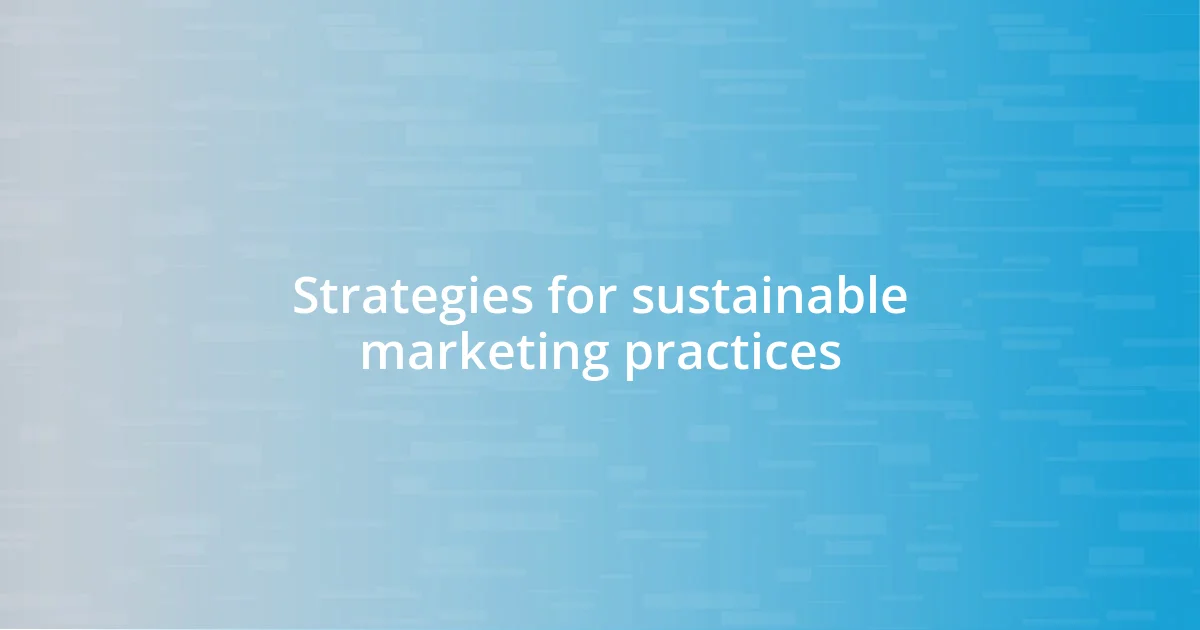
Strategies for sustainable marketing practices
Sustainable marketing practices can take various forms, but one impactful strategy is leveraging digital platforms for eco-conscious outreach. I recall launching a campaign through social media that focused on green living tips and featured user-generated content. Seeing my audience engage and share their own sustainable practices made me realize how powerful community-driven initiatives can be. It sparked genuine conversations and helped create a collective sense of purpose among participants. Have you ever noticed how sharing experiences can strengthen connections?
Another effective strategy involves transparent communication about a brand’s sustainability efforts. During a project I managed, we emphasized our partnership with local artisans who used recycled materials. By highlighting their stories, we not only built credibility but also connected emotionally with our audience. The feedback was overwhelmingly positive—consumers appreciated the authenticity and were eager to champion our cause. It got me thinking, wouldn’t it be amazing if all brands were as open about their practices?
Lastly, incorporating sustainable practices into product design can differentiate a brand in the market. For instance, I once worked on a product line that prioritized minimal packaging and biodegradable materials. The initial investment was significant, but the long-term benefits were undeniable. Sales increased, and customers felt good about supporting a brand that aligned with their values. Every time I reflect on that experience, I am reminded that sustainability is not just an ethical choice; it’s a smart business strategy.
| Strategy | Description |
|---|---|
| Community Engagement | Leverage social media to foster discussions around sustainable practices. |
| Transparent Communication | Share authentic stories behind sustainability efforts to build trust. |
| Sustainable Product Design | Prioritize eco-friendly materials to attract environmentally-conscious consumers. |
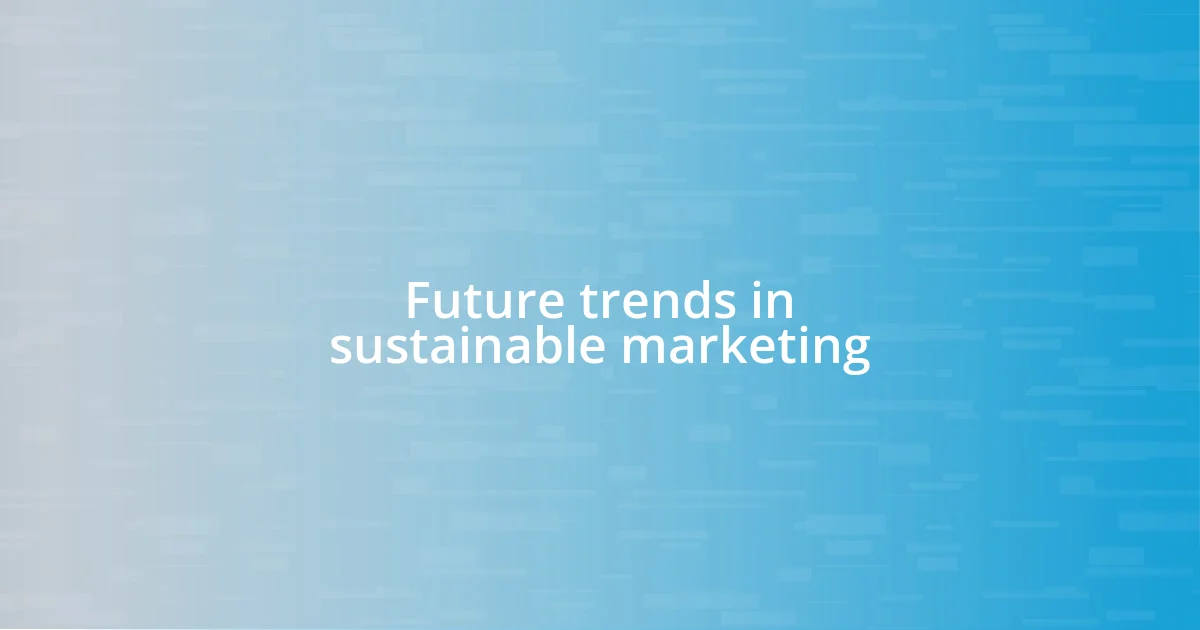
Future trends in sustainable marketing
Looking ahead, I see an increasing emphasis on personalization within sustainable marketing. Brands are beginning to leverage data analytics to tailor their sustainable initiatives to individual consumer preferences. I recall a project where we analyzed customer feedback and found that certain eco-friendly attributes resonated more with specific demographics. It made me wonder, how powerful could it be if brands could speak directly to what their audience cares about? This level of personalization not only deepens consumer engagement but also elevates the overall impact of sustainability efforts.
Another trend I’m excited about is the rise of circular economy principles in marketing. More businesses are not just promoting their products but are encouraging customers to return, recycle, or repurpose their purchases. I remember a company that introduced a buy-back program, allowing customers to send back used products for a discount on their next purchase. It created a sense of community and responsibility. Have you ever felt a twinge of pride knowing that what you bought has a second life? This initiative enhanced customer loyalty and underscored a brand’s commitment to sustainability in a way that felt genuinely participatory.
Lastly, I believe we’ll see an increase in collaboration among brands to amplify their sustainability messages. I once worked with several companies on a joint campaign focused on reducing plastic waste, and the synergy was electrifying. We shared resources and messages, ultimately reaching a wider audience and reinforcing our commitment to the cause. It struck me how, when brands come together for a shared purpose, they create a louder, more impactful voice. Wouldn’t it be amazing to see even more brands joining forces in this way? The future of sustainable marketing certainly looks to be about collaboration and collective action, and I can’t wait to see where it goes.
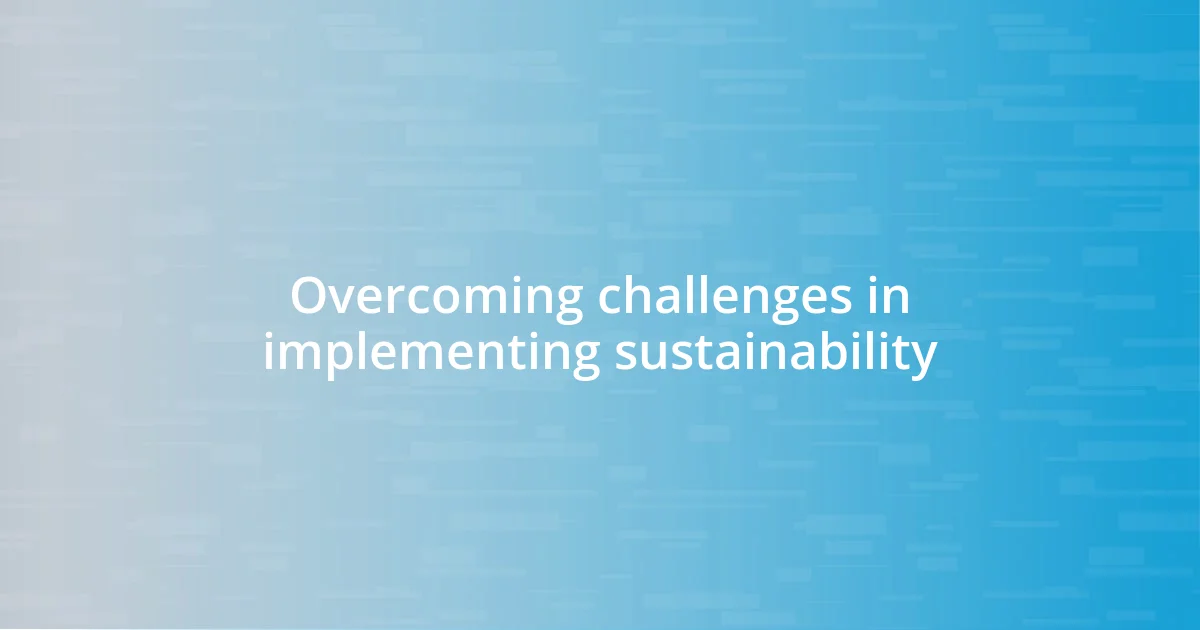
Overcoming challenges in implementing sustainability
Implementing sustainability in marketing often feels like navigating a minefield of challenges. One significant hurdle I faced was resistance from traditional team members who were skeptical about shifting focus to sustainable options. I remember organizing a workshop that featured guest speakers from successful sustainable brands. Witnessing their enthusiasm and success stories sparked new interest and opened up a dialogue about the real value of sustainability—both ethically and financially. Isn’t it fascinating how sharing success stories can transform mindsets?
Another challenge comes from the complexity of measuring the effectiveness of sustainable initiatives. Early on, I implemented a tracking system to assess our green marketing efforts. The process was overwhelming at first, as the data was scattered. However, as I refined the metrics to reflect meaningful outcomes, I discovered insights that guided our future campaigns. This experience taught me that with the right approach, measuring success can turn into a powerful tool for gaining internal buy-in. Have you experienced that “aha” moment when data suddenly makes everything clearer?
Financing sustainable initiatives can often be daunting. I recall pitching an idea for a new eco-friendly product line, and the initial budget seemed astronomically high. Yet, I conducted research demonstrating the growing consumer demand for sustainable options and presented a compelling case to stakeholders. Their hesitation softened when they realized the potential for long-term savings and market growth. Sometimes, all it takes is a well-researched proposal to turn skepticism into support. What strategies have you found most persuasive in overcoming financial objections?











